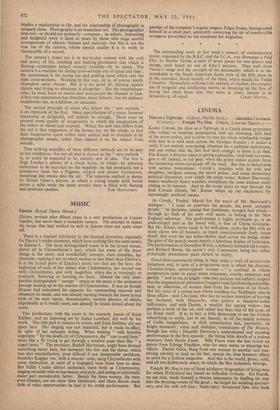MUSIC
Electra. (Royal Opera House.) Electra, revived after fifteen years in a new production at Covent Garden, has never been a complete success. The attempt to repeat the recipe that had worked so well in Salome does not quite come off.
There is a marked inferiority in the musical invention, especially for Electra's wilder moments, which have nothing like the same power as Salome's. The most distinguished music is in the lyrical scenes, above all in Chrysothemis's part, which has some of the finest things in the score, and wonderfully conveys, even ennobles, her character, making it not so much weaker as less bitter than Electra's. It is the lyrical parts of Electra's music too that are the best—the beginning of each of her scenes with Clytemnestra, her second one with Chrysothemis, and with Aegisthus, when she is cunningly or ironically flattering or fawning on them. Almost the only com- parable distinguished " savage " music in the score is the orchestral passage leading up to the murder of Clytemnestra. It was as though Strauss had exhausted his capacity for representing neurosis and obsession in music, and was already turning towards the more lyrical style of his next opera, Rosenlcavalier, certain phrases of which, improbable as it would seem, can ahead)", be found dotted about the score.
This production, with the score in the masterly hands of Erich Kleiber, and an imposing set by Isabel Lambert, did well by the work. The title part is ruinous to voices, and Erna Schltiter did not spare hers. Her singing was not beautiful, but it made its effect, in spite of her unhappy acting. When waiting " with horrible eagerness " for the death cry of Clytemnestra, she" ran to and from" more like a fly trying to get through a window pane than like " a caged beast." The producer, Rudolf Hartmann, might have devised something better here, but moments like this and the dance, which was also unsatisfactory, pose difficult if not insuperable problems.• Annelies Kupper too, with a sweeter voice, sang Chrysothemis with some distinction, in spite of a strangled tone from time to time. But Edith Coates almost surpassed them both as Clytemnestra, singing certainly with no less beauty and style, and acting an admittedly easier part considerably better. Beside the three women, the men, even Orestes, are no more than incidental, and Hans Braun made little of what-opportunities he had in his stolid performance. But another of the company's regular singers, Edgar Evans, distinguished himself in a small part, admirably conveying the air of comfortable arrogance prescribed by the composer for Aegisthus.
The outstanding work at last week's concert of contemporary music, organised by the B.B.C. and the I.C.A., was Hommage a Paul Klee, by Sandor Veress, a suite of seven pieces for two pianos and strings, each based on one of Klee's pictures. They well show Veress's range and the strength of his personality, which is as un- mistakable in the South American dance style of the fifth piece as in the extended, florid melody of the third, which recalls his Violin Concerto. Particularly striking is his subtlety of rhythm, his complex use of irregular and conflicting metres, so breaking up the flow of strong and weak beats that they seem at times, almost as in


































 Previous page
Previous page